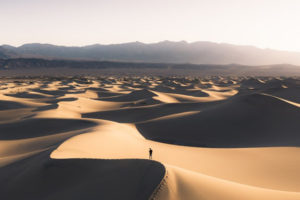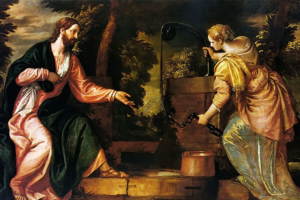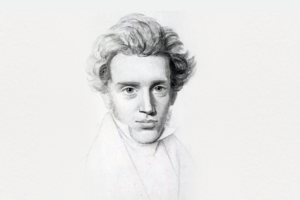Palm Sunday Of the Lord’s Passion
MT 21:1-11 Isaiah 50:4-7 Ps 22 Philippians 2:6-11 MT 26:14—27:66
I can almost smell the fresh cut fronds as I enter the church, the satin-smooth leaflets, the ridges and furrows, satisfying to the touch as I draw them between my index finger and thumb, the snap of a shorn leaf right down the center. The traditions of Palm Sunday make this liturgy the most sensory rich liturgical celebration of the year, likewise the most memorable.
Given our quarantine limitations, what will Palm Sunday be like this year? We will miss something of our normal traditions to be sure, but we can still participate, I believe, in a different though undiminished way.
Passion Sunday is the starting point of our annual meditation on the paschal mystery through the liturgy. This day in the liturgical calendar, we experience the full narrative of the passion of Christ. It is not just a drama in the literary sense but in the theatrical sense, in that parts are read by all through a dramatic reading of the passion. Some parishes even include costumed dramas.
This aspect of the liturgical celebration will be muted for us as we participate from home via livestreaming. But like any good story, the special effects are not what draw us in, only a compelling narrative can do that. This we have in spades!
We begin with Jesus’ triumphant entry into Jerusalem in the procession with palms. There is a sweeping, dramatic movement on display from ‘spreading their cloaks on the road’ (Mt 21:8) as he rode a donkey into the city, to the crowd shouting: “Crucify him! Crucify him!” The effect is chilling when you read aloud, in your own voice ‘crucify him’. But that is precisely the point.
We are participants in this drama, sin and the consequences of sin are part of the human condition experienced by us all. And the liturgies of Lent and Easter are specially shaped to help us enter into a profound meditation on this mystery in our own life. But more than meditation, the liturgy does something real in us.
It is tempting to think that the work of the liturgy cannot take effect on us as such, though we attempt to celebrate it virtually. But, let us not dismiss the possibility outright. This warrants some reflection. Maybe our participation is not virtual, but actual, and the virtual means are aids to help us in this very real participation.
In his book The Spirit of the Liturgy (SL), Pope Benedict writes about a path to the recovery of the true spirit of the liturgy in its cosmic and historical significance. I find what he has to say relevant to our current reality, a bit of wisdom about liturgy to help us embrace this striving at true worship.
He points out that the things of God have always been obscure for mankind. The Israelites struggle to grasp the reality of true worship in the promised land and in exile alike. What the scriptures reveal about worship is that it consists of more than just cult, “Israel learns how to worship God in the way He himself desires. Cult, liturgy in the proper sense, is part of this worship, but so too is life according to the will of God; such a life is an indispensable part of true worship.” (SL, 17) There is an anticipation, a prefiguring of life as it will be, in the liturgical act, but not merely as moralism. It is “the eschatological dynamism of the liturgy.” (SL, 59)
“The liturgy is not about the sacrificing of animals,” Benedict writes, “of a ‘something’ that is ultimately alien to me. This liturgy is founded on the Passion endured by a man who with his ‘I’ reaches into the mystery of the living God himself, by the man who is the Son. So it can never be a mere actio liturgica. Its origin also bears within it its future in the sense that representation, vicarious sacrifice, takes up into itself those whom it represents; it is not external to them, but a shaping influence on them.” (SL, 57)
The liturgy transforms us as it does the elements, because we are drawn into the action of God in his redemption of the world. Understood this way, Benedict adds, external actions of the ritual, “…are quite secondary…” (SL, 174) While we are removed from a physical presence in the external sense of the liturgical celebration, we ought to be able to participate as actively as ever because the oratio in which we participate is not confined to space and time. It is a transcendent reality we are brought into in Christ.
For anyone who feels distant from the liturgy, I contend that we are up to our necks in it! The ‘theo-drama’ unfolds before us and we are deeply implicated in it. Consider the many doctors and nurses who have died of the coronavirus, numbering 100 world wide as of writing this. What can be more eucharistic than the self-sacrificial love of those who knowingly put themselves in harms way to treat the sick.
Consider all the ‘essential workers’ who are working the fields and keeping the shelves stocked so there is food to feed our families.
Consider also, the oblation of every person who is currently caring for a loved one, for their parents, for their neighbor, for strangers, by sacrificing their freedom and their economic stability to protect each other from the illness.
Benedict reminds us of the element of exitus and reditus by which we understand that everything in creation, life itself, is grace. It pours forth from the love of God. And all things wish to return to the creator, offered in thanksgiving, the Eucharist. The cosmic dimension is present in the material creation received from God and worked upon by human hands, offered up to him. The historical dimension is the joys and elations, the pain and suffering of the world, our own living and breathing, our story and identity made present in the gifts of the altar among which is the bread and wine, but more salient, our bodies which become a “living sacrifice” (Rm 12:1).
We grieve the loss of our traditional experience of the liturgy this year, but our current reality allows us to experience a heightened version of it. The divine pedagogy does not just recount a story to us, it is incarnational. It begins with our lived experience, and today we are living a passion of our own. Finally, it transforms our life and the entire world. “The new Temple, not made by human hands, does exist, but it is also still under construction.” (SL, 50)
Image credit – source of original image: https://en.wikipedia.org/wiki/File:S%C3%B8ren_Kierkegaard_(1813-1855)_-_(cropped).jpg




Thank you , you put into words what I feel . 🙏🏼